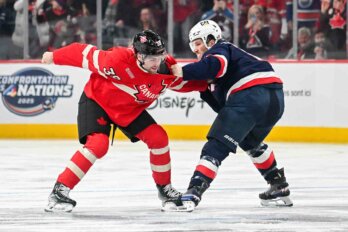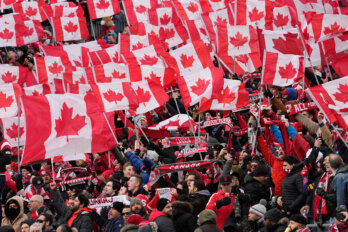At 9:30 a.m. on May 20, 2001, the graduate joined his classmates in the grandstand, one more student in a field of North-Carolina-blue. He bounced: jubilant, waving, pointing to his mom, herself a teacher. He promised her he’d finish school, and, a couple of years late, he had. He raised his fist, a salute to his degree in Afro-American studies. He was, at that moment, outrageously famous, rich, and seemingly unstoppable.
By 11 a.m., Vince Carter, the tail of his baby-blue robe trailing behind him, boarded a private plane. His eventual destination, Philadelphia. His Toronto Raptors teammates awaited, ready for the biggest game in franchise history: with the playoff series tied 3-3, a win meant they’d advance to the Eastern Conference finals for the first time; a loss meant the season was over. On barstools and in his own locker room, on the CBC, NBC, ESPN and in the New York Times, people debated. A long day of travel, they said, would tire him out before the 5:30 p.m. tip-off. His team, and his city, needed a win. Had Carter, the NBA’s brightest young star, abandoned them for a photo-op?
After the plane landed, Carter emerged in black robes, as if primed for a funeral. He looked exhausted. NBC’s Andrea Joyce opened an interview with “I’m here with Vince Carter, the newest UNC graduate, has a nice ring to it, doesn’t it?” He stared at the ground, “I’m just glad it’s over.” The critics, it seemed, might have been right: the travel and excitement had tired him out. Or maybe it was the relentless questions that did him in. Regardless, as the media gathered, it was clear: What happened next would be a referendum on his legacy.
The game started, and the series’ typically free-flowing action was stilted. Carter looked lost. For Philadelphia and its star Allen Iverson, it was the same story. Philly jumped out to an early lead, but Toronto countered. Philadelphia led late in the fourth quarter, 88-87. With under one-minute remaining, Iverson missed a jumper. The Raptors had the ball with two seconds left, and, with the season coming down to one shot, everyone in the building knew who would get the ball.
The inbound came and Carter caught it cleanly. He pump-faked a defender before launching a long fade-away jumper with 1.8 seconds on the clock; one of the most difficult shots in basketball, but a shot he’d hit hundreds of times. This time, though, he missed. The debate was fierce and immediate, and it spread across the continent. “Carter Not to Blame,” led one Toronto Star editorial. “Selfish Carter Still Has a Few Things to Learn,” countered the LA Times, in which the writer declared Carter’s decision “not worthy of a role model.” It was the once-irreproachable Carter’s first real exposure to the b-side of stardom, which would eventually run him out of Toronto.
In The Carter Effect, documentary-maker Sean Menard unveils an oral history of Carter, the most important athlete in Toronto sports history. Through interviews with Raptors legends like Tracy McGrady and Charles Oakley, artists Drake and Kardinal Offishall, and emerging Canadian basketball icons such as Tristan Thompson and Cory Joseph, Menard redraws the picture of Carter. What emerges is a long overdue shift in the narrative—pushing aside the cautionary tale of unfulfilled potential to focus instead on Carter’s decade-long influence on a city. Menard’s film argues that he was the impetus for Toronto’s burgeoning hip-hop and basketball culture. Without him, it reveals, Canadian basketball wouldn’t be nearly as strong, and artists like Drake—who says that Carter “made the city cool”—wouldn’t have been as inspired by their hometown. If the documentary wants you to know one thing, it’s that Toronto would be a worse place, today, if the kid from Daytona Beach, FL, had never come. It may never have become the 6ix.
But Carter’s story is not simply about basketball, and it’s not just about Toronto. It’s also about choosing heroes, how they become villains, and how they find their way back.

In 1999, before I discovered Carter, I was like any seven-year-old white boy from Toronto: I played hockey, and when I wasn’t playing hockey, I watched hockey. I was fanatic about the sport, and those who played it—the boyish ebullience of Mats Sundin and the fabled toughness of Gary Roberts.
At the time, the Raptors had two future Hall-of-Fame players in Carter and McGrady (or T-Mac), both dragging the city into basketball relevance. Each year, the NBA’s most anticipated event at its all-star showcase is the slam-dunk contest, where basketball’s best compete for the title of the league’s best dunker (the slam-dunk manifesting basketball’s obsession with muscular virility).
In that season’s competition, Carter became legend; he’d leap, reaching heights once thought impossible, and then, remarkably, he’d float, twisting and turning mid-air like a suspended ballerina. The image of him, victorious, strutting towards the camera, became indelible to Toronto sports fans. Carter was mesmerizing. He played with an impossibly-ornery joy; a creativity inseparable from ferocity. He seemed more than human, and so the nickname: “Half-man, half-amazing.” Hoops popped up around the city, Carter hosted camps; finally, a game for kids who didn’t like hockey.
And then, in the playoffs months later, they lost. And T-Mac left. But I didn’t blame him; this was Carter’s team, nobody else could matter. Carter went to the Olympics that summer, his typically bald head now hugged by a tight afro. In a game against France, Carter got the ball, guarded by 7’2 Frederic Weis. Instead of going around him, Carter jumped, his 6’6 frame seemed to climb forever over the stunned Frenchman’s head—to this day perhaps the most sensational athletic feat accomplished in Olympic basketball. Carter had arrived.
The next year’s playoffs, then, in 2001, were to be his. In each of the Raptors’ wins against Philadelphia in that series, Carter had been indomitable. He and Allen Iverson were in the midst a magnificent battle of stars. One would score 50 points, the other would score 54, and back and forth they’d go. At my elementary school, the Raptor logo was almost as prominent as the Maple Leaf. I was in third grade, and mesmerized. A reporter asked Iverson, after a Philadelphia loss, “Is there any way to stop him?” “No, man,” he shot back, “if there was we would’ve done it.” And then, Carter decided to graduate.
There’s an alternate universe where Carter hits his final shot during the 2001 playoffs against Philadelphia, and it’s one of the great moments in sports; a young man so dedicated to his mother and his education that he’d fly-in for his diploma, and so outlandishly talented that he’d win his team the game.
Instead, Carter would become the target of vitriol unparalleled in Toronto sports. It was a slow build—first he wasn’t a leader, then he was a wimp. A few years later, stoking the perception that he wanted out, the team traded him to New Jersey for two guys nobody had heard of, and one guy who refused to come. And while, to this day, he insists he never wanted to go, he was immediately labelled a traitor, and fans defaced his jersey.
In 2005, he’d return to Toronto in a Nets uniform: nearly a half-decade after the loss to Philadelphia, after the injuries, and the mood swings, and the declaration he’d never dunk again; and after the team decided Carter was a “mama’s boy,” and took away Michelle Carter-Scott’s parking spot. Young children held signs saying their parents taught them to try their best all the time. When he stepped on the court, the boos of a city spurned shook the arena. Carter had hosted camps, built a charitable foundation, created opportunity for Toronto’s kids. But he had committed the one unforgivable sin of a hero: he also thought about himself.

Sports executives have no greater psychological weapon against players than the concept of loyalty. Franchises and fans expect the athlete to give himself to the city completely. Anything less, and media declare him a malcontent; last year’s shaming of Kevin Durant—who left Oklahoma City for their Californian rivals, the Golden State Warriors—is the most recent example. Fans burned his jersey, and printed his face on toilet paper. An elementary school teacher gave kids a handout saying “DON’T BE A … Kevin Durant” adding “don’t be a KD. Don’t take the easy way out.” Much is expected of the athlete, but, once his performance wanes, nothing is given. The Blue Jays’ brash once-superstar Jose Bautista will most-likely be told to leave Toronto this winter, his play having declined significantly. And after he’s been dumped, hardly anyone will protest.
The athletic hero, then, is faced with the impossible. He is to dedicate himself wholly to his craft. He is to be vicious and unrelenting to opponents, but wholesome with fans and media. He’s to be quick-witted and charming, but should suppress independent thought. He is to accept nothing less than victory, but to be gracious in defeat. Carter, though, was never comfortable with that burden, nor with the consuming scrutiny. At his best, he could be everything the city wanted, but he wasn’t always at his best. Criticism hurt him, and he would become openly frustrated with management, and with media. Few among us would act otherwise, but, as the star of the team, that’s forbidden.
Carter wasn’t a villain: he was just miscast as a hero.

Sport franchises operate in highly simplified narratives; its stars perceived in binary terms. Carter built himself into a phenomenon, and made his world limitless. The problem, however, is that he also became a leading man in a multi-billion dollar morality play. Thrust into the role by his talent, he wasn’t prepared for the job. It worked, for a while. He could be mean, he had swagger. Surely, he enjoyed it. But it wasn’t him, and he knew it.
To hear Carter in Menard’s documentary is to know he was never meant to be a star. He’s contrite, but not apologetic. He seems uncomfortable with his own celebrity, and laments the way he left Toronto. He speaks of his time here like it happened outside himself. “The people of Toronto,” he says, “they watched me become this thing, Vinsanity.” It’s as if he’s speaking of an entirely different person. In a way, he is.
Since Toronto, he’s jumped around the NBA, and dimmed his own light at each stop. He focused on being a good teammate and mentor, and was beloved at everywhere he’s gone. He seems genuinely happy, more than he ever was here. Canada is a nascent basketball power, and the guys leading the way went to Carter’s camp. He likes that. Today, he’s still playing well, even into his forties—this offseason signing a new contract with Sacramento. He’s still dunking, and still productive, as the oldest man in the NBA: in longevity, he’s found a new way to challenge the boundaries of athletic excellence. He seems content in his quieter life.
His legacy is spelled out in Menard’s documentary: a city forever changed. If Carter never felt comfort in Vinsanity, that’s on us—we created it. Now, he’s happy being Vince.





